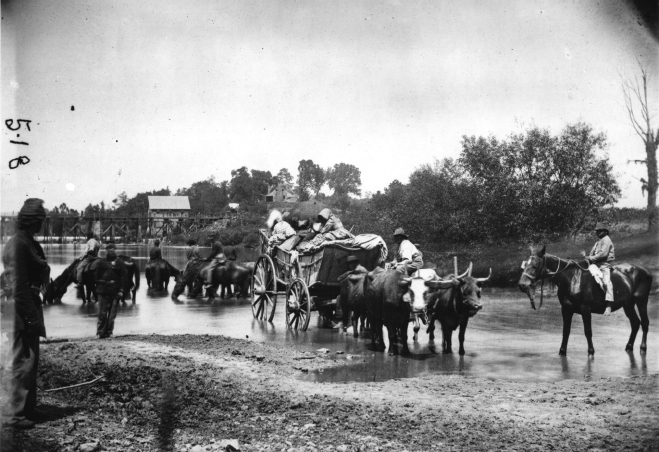From Slaves to Contraband
Printed Page 438
Section Chronology
Lincoln detested human bondage, but as president he felt compelled to act prudently in the interests of the Union. He doubted his right under the Constitution to tamper with the “domestic institutions” of any state, even states in rebellion. An astute politician, Lincoln worked within the tight limits of public opinion. The issue of black freedom was particularly explosive in the loyal border states, where slaveholders threatened to jump into the arms of the Confederacy at even the hint of emancipation.
CHAPTER LOCATOR
Why did both the Union and the Confederacy consider control of the border states crucial?
Why did each side expect to win?
How did each side fare in the early years of the war?
How did the war for union become a fight for black freedom?
What problems did the Confederacy face at home?
How did the war affect the economy and politics of the North?
How did the Union finally win the war?
Conclusion: In what ways was the Civil War a “Second American Revolution”?
 LearningCurve
LearningCurve
Check what you know.
Black freedom also raised alarms in the free states. The Democratic Party gave notice that adding emancipation to the goal of union would make the war strictly a Republican affair. Moreover, many white Northerners were not about to risk their lives to satisfy what they considered abolitionist “fanaticism.” “We Won’t Fight to Free the Nigger,” one popular banner read. They feared that emancipation would propel “two or three million semi-savages” northward, where they would crowd into white neighborhoods, compete for white jobs, and mix with white “sons and daughters.”
Yet proponents of emancipation pressed Lincoln as relentlessly as did the anti-emancipation forces. Abolitionists argued that by seceding, Southerners had forfeited their right to the protection of the Constitution and that Lincoln could — as the price of their treason — legally confiscate their property in slaves. When Lincoln refused, abolitionists scalded him. Frederick Douglass labeled him “the miserable tool of traitors and rebels.”
The Republican-dominated Congress declined to leave slavery policy entirely in President Lincoln’s hands. In August 1861, Congress approved the Confiscation Act, which allowed the seizure of any slave employed directly by the Confederate military. It also fulfilled the free-soil dream of prohibiting slavery in the territories and abolished slavery in Washington, D.C. Democrats and border-state representatives voted against even these mild measures.
Slaves, not politicians, became the most insistent force for emancipation. By escaping their masters by the tens of thousands and running away to Union lines, they forced slavery on the North’s wartime agenda. Runaways made Northerners answer a crucial question: Were the runaways now free, or were they still slaves who, according to the fugitive slave law, had to be returned to their masters? At first, Yankee military officers sent the fugitives back. But Union armies needed laborers, and at Fort Monroe, Virginia, General Benjamin F. Butler called them contraband of war, meaning “confiscated property,” and put them to work. Congress made Butler’s practice national policy in March 1862 when it forbade returning fugitive slaves to their masters. Slaves were still not legally free, but there was a tilt toward emancipation.

contraband of war
 General Benjamin F. Butler’s term for runaway slaves, who were considered confiscated property of war, not fugitives, and put to work in the Union army. This policy proved to be a step on the road to emancipation.
General Benjamin F. Butler’s term for runaway slaves, who were considered confiscated property of war, not fugitives, and put to work in the Union army. This policy proved to be a step on the road to emancipation.
Lincoln’s policy of noninterference with slavery gradually crumbled. To calm Northerners’ racial fears, Lincoln offered colonization, the deportation of African Americans from the United States to Haiti, Panama, or elsewhere. Congress voted a small amount of money to underwrite colonization, but practical limitations and stiff black opposition sank the scheme.
While Lincoln was developing his own antislavery initiatives, he snuffed out actions that he believed would jeopardize northern unity. He was particularly alert to Union commanders who tried to dictate slavery policy from the field. In August 1861, when John C. Frémont, former Republican presidential nominee and now commander of federal troops in Missouri, freed the slaves belonging to Missouri rebels, Lincoln forced the general to revoke his edict. The following May, when General David Hunter freed the slaves in Georgia, South Carolina, and Florida, Lincoln countermanded his order. Events moved so rapidly, however, that Lincoln found it impossible to control federal policy on slavery.